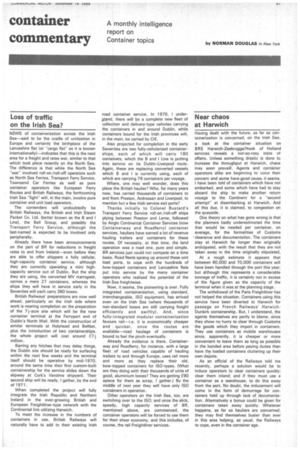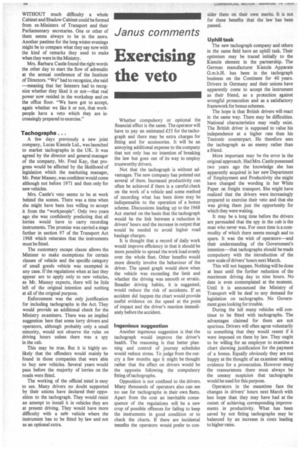Near chaos at Harwich
Page 59

Page 60

If you've noticed an error in this article please click here to report it so we can fix it.
Having dealt with the future, as far as containerization is concerned, on the Irish Sea. a look at the container situation on BRS Harwich-Zeebrugge/Hook of Holland services reveals a not-so-rosy state of affairs. Unless something drastic is done to increase the throughput at Harwich, chaos may soon prevail!. Agents and container operators alike are beginning to voice their concern and some have good cause, it seems. I have been told of containers which have not embarked, and some which have had to stay aboard the ship to make another return voyage to the Continent for a "second attempt" at disembarking at Harwich. And all this due, it is claimed, to congestion on the quayside.
One theory on what has gone wrong is that the planners badly underestimated the time that would be needed per container, on average, for the formalities of Customs 'clearance and documentation. The containers stay at Harwich far longer than originally anticipated, with the result that they are not taken away in the time originally stipulated, At a rough estimate it appears that between 60,000 and 70,000 containers will have been handled through the port this year: but although this represents a considerable tonnage of traffic, it is certainly not in excess of the figure given as the capacity of the terminal when it was at the planning stage.
The withdrawal of the Paris Freightliner has not helped the situation. Containers using this service have been diverted to Harwich for passage on French Railways' HarwichDunkirk containership. But, I understand, the agents themselves are partly to blame, since they show no hurry to clear through Customs the goods which they import in containers. They use containers as mobile warehouses since, apparently, it is cheaper or more convenient to leave them as long as possible in the bonded area before paying duties than have the loaded containers cluttering up their own depots.
As an official of the Railways told me recently, perhaps a solution would be to induce operators to clear containers quickly; clear them inland; and if they must use a container as a warehouse, to do this away from the port. No doubt, the inducement will come in the form of demurrage for containers held up through lack of documentation. Alternatively a bonus could be given for containers taken away quickly. Whatever happens, as far as hauliers are concerned, they may find themselves busier than ever in this area helping, as usual, the Railways to cope, even in the container age.
WITHOUT much difficulty a whole Cabinet and Shadow Cabinet could be formed from ex-Ministers of Transport and their Parliamentary secretaries. One or other of them seems always to be in the news. Another pastime for the long winter evenings might be to compare what they say now with the kind of remarks they used to make when they were in the Ministry.
Mrs. Barbara Castle found the right words the other day to start the flow of adrenalin at the annual conference of the Institute of Directors. "We" had to recognize, she said —meaning that her listeners had to recognize whether they liked it or not—that real power now resided in the workshop and on the office floor. "We have got to accept, again whether we like it or not, that workpeople have a veto which they are increasingly prepared to exercise."
Tachographs.
A few days previously a new joint company, Lucas Kienzle Ltd., was launched to market tachographs in the UK. It was agreed by the director and general manager of the company, Mr. Fred Kay, that progress would be affected by the likelihood of legislation which the marketing manager, Mr. Peter Massey, was confident would come although not before 1971 and then only for new vehicles.
Mrs. Castle's veto seems to be at work behind the scenes. There was a time when she might have been less willing to accept it from the "workpeople". Only two years ago she was confidently predicting that all lorries would have to carry recording instruments. The promise was carried a stage further in section 97 of the Transport Act 1968 which reiterates that the instruments must be fitted.
The customary escape clause allows the Minister to make exemptions for certain classes of vehicle and the specific category of small goods vehicle was exempted in any case. If the regulations when at last they appear are to apply only to new vehicles, as Mr. Massey expects, there will be little left of the original intention and nothing at all of the original purpose.
Enforcement was the only justification for including tachographs in the Act. They would provide an additional check for the Ministry examiners. There was an implied suggestion here that some lorry drivers and operators, although probably only a small minority, would not observe the rules on driving hours unless there was a spy in the cab.
This may be true. But it is highly unlikely that the offenders would mainly be found in those companies that were able to buy new vehicles. Several years would pass before the majority of lorries on the roads were fitted.
The working of the official mind is easy to see. Many drivers no doubt supported by their unions have declared their opposition to the tachograph. They would resist an attempt to install it in vehicles they are at present driving. They would have more difficulty with a nelv vehicle where the instrument has to be fitted by law and not as an optional extra.




















































































































